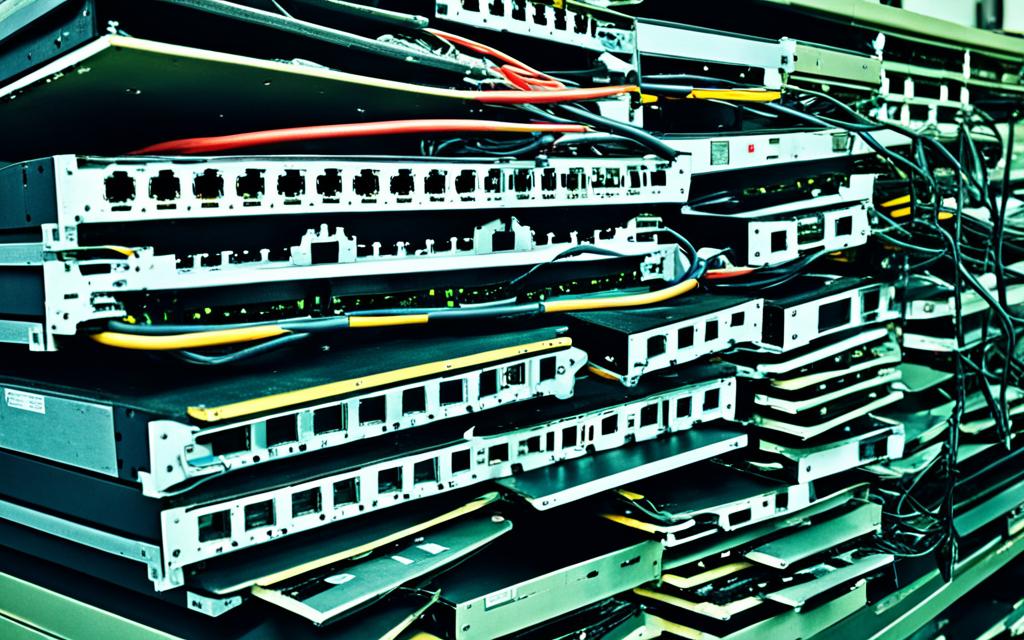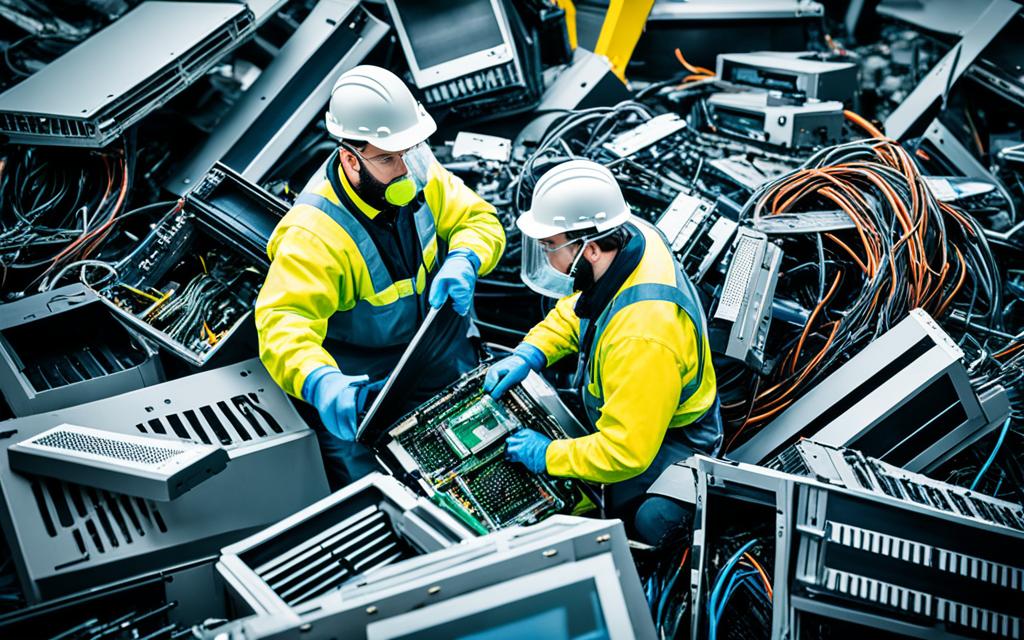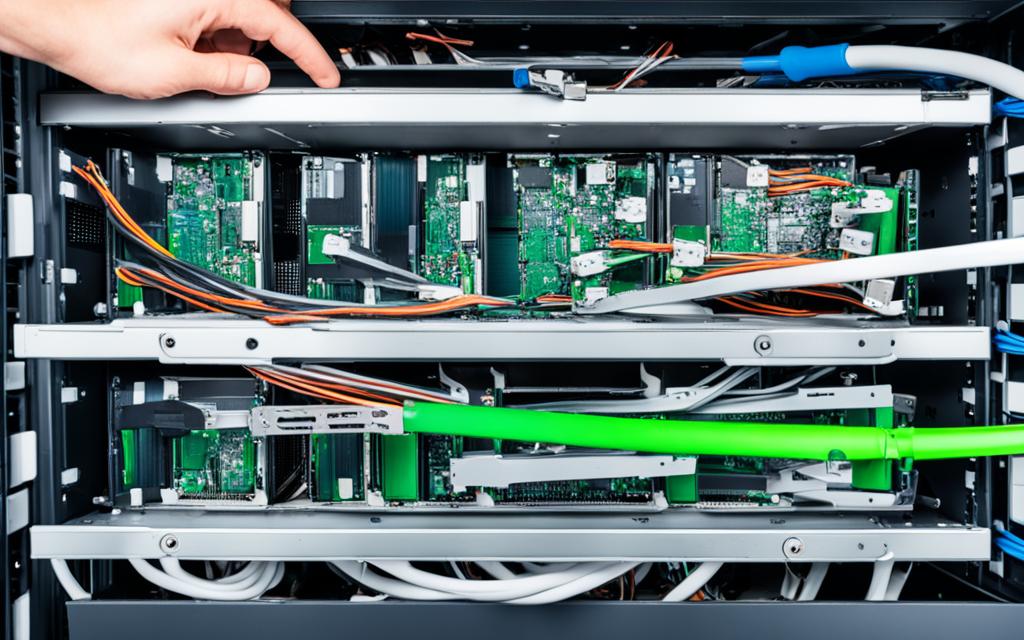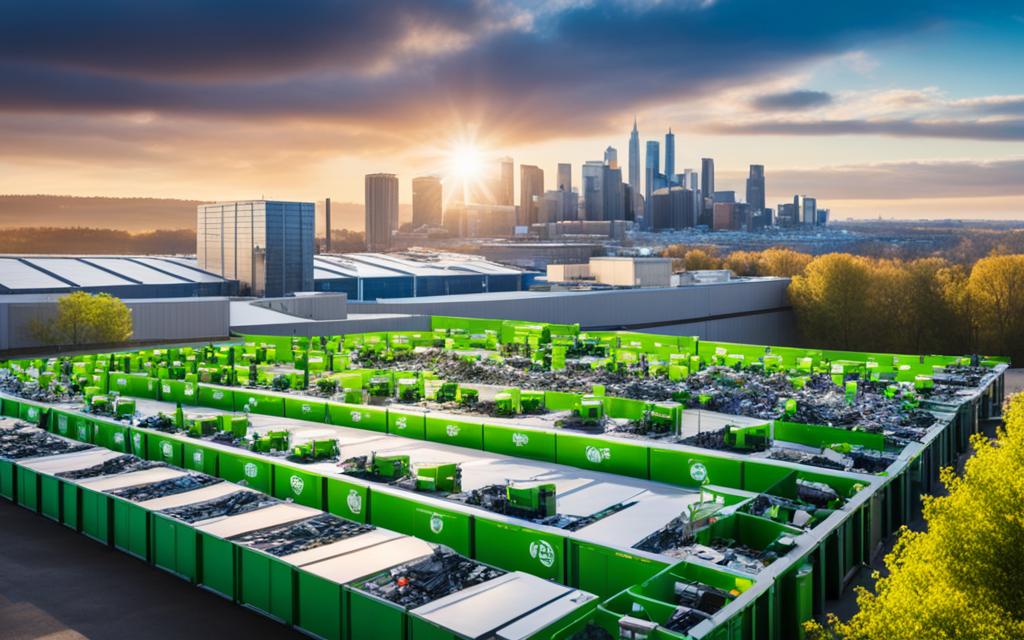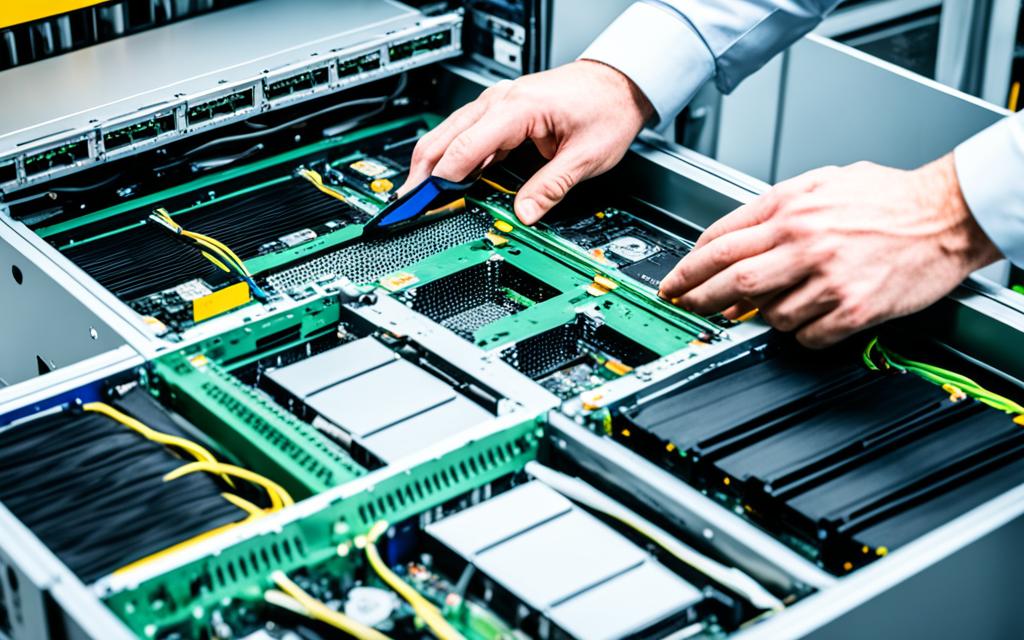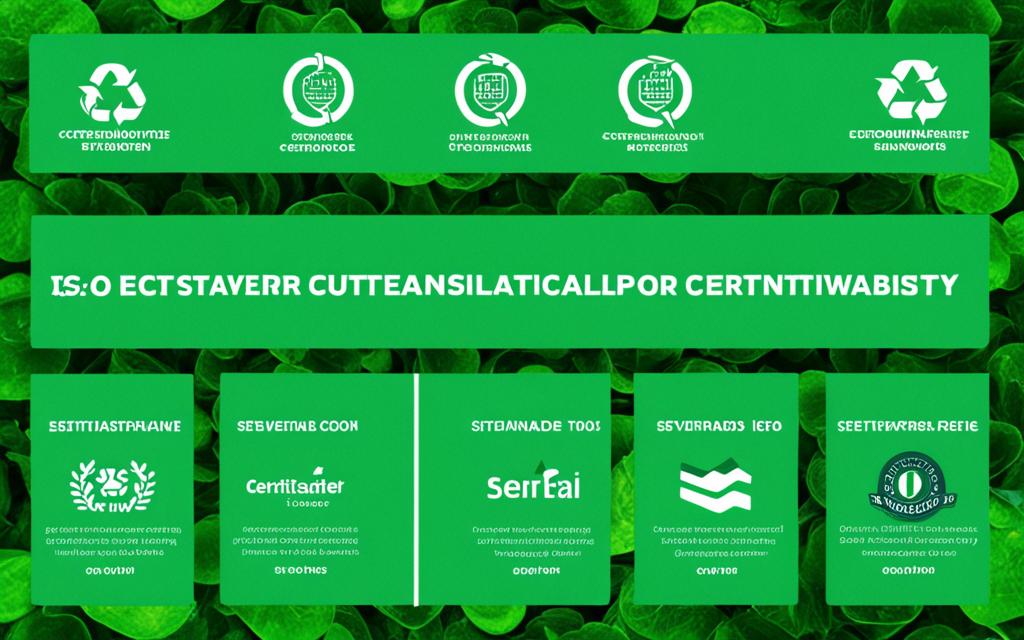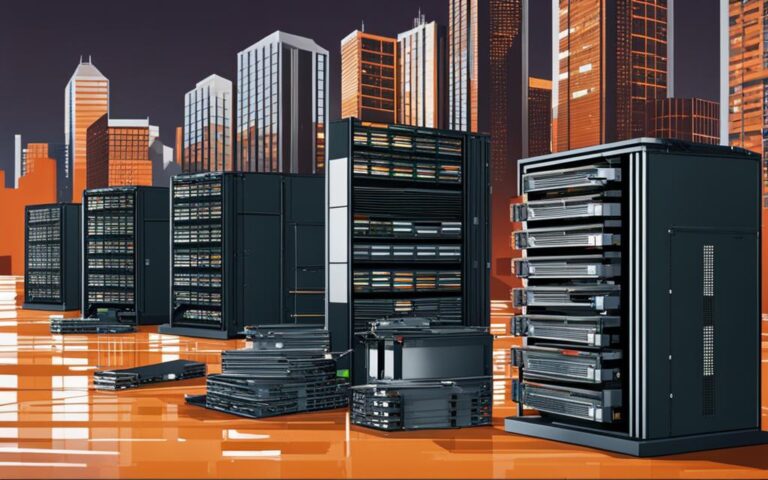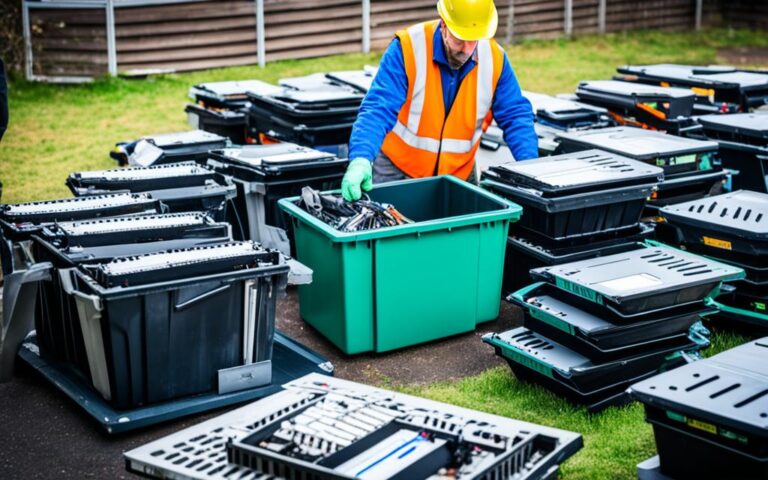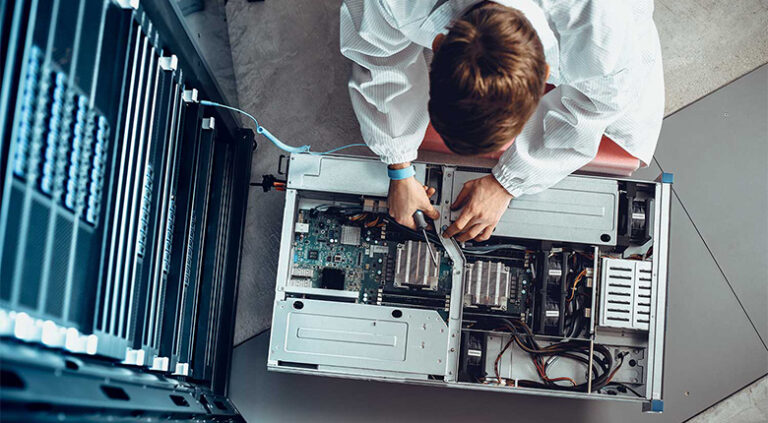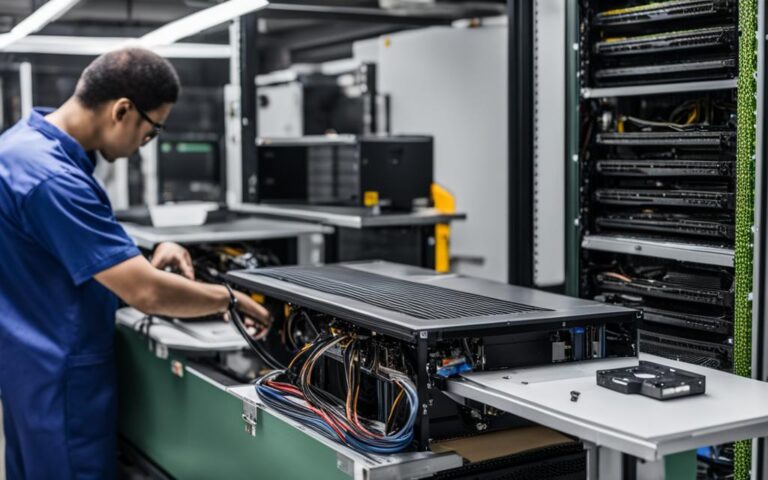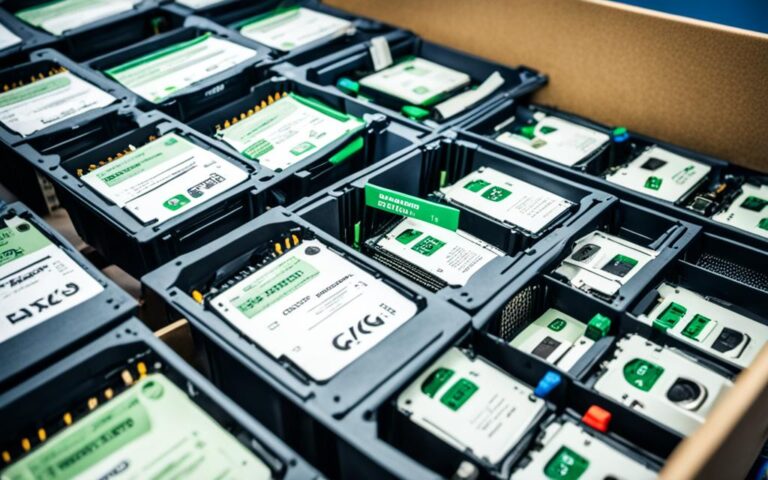How Server Recycling Enhances Data Security
Server recycling plays a crucial role in enhancing data security and protecting sensitive information during the disposal process. Improper disposal of servers can lead to data breaches and unauthorized access to valuable data. To ensure data security, it is important to follow secure data disposal methods and adhere to data protection laws such as GDPR and HIPAA. Organizations should adopt sustainable IT asset disposition methods and learn how to securely recycle enterprise computers to balance environmental and security risks.
Proper server recycling ensures that sensitive information is permanently erased from retired devices, minimizing the risk of data leaks. Sensitive data can include customer records, employee information, financial transactions, and confidential business data. By securely disposing of servers, organizations can protect themselves and their stakeholders from potential harm.
Moreover, server recycling should be conducted in compliance with environmental regulations to minimize e-waste and promote sustainable practices. It is essential to dispose of servers responsibly, considering the hazardous materials they contain. By recycling servers, valuable resources can be conserved, and the harmful impact of electronic waste on the environment can be reduced.
In the following sections, we will delve deeper into the importance of secure data disposal, methods for secure data destruction, sustainable retirement options for devices, and the environmental benefits of computer recycling. We will also discuss handling hazardous materials found in computers and the steps organizations can take to ensure they’re following safety protocols.
Stay tuned and learn how server recycling can make a significant difference in data security, environmental sustainability, and overall corporate responsibility.
The Importance of Secure Data Disposal
Improper disposal of computers can have severe consequences, including data breaches that can lead to financial and legal ramifications for organizations. It is paramount to prioritize secure data disposal methods to prevent unauthorized access to sensitive information. Simply discarding old computers without proper data security measures leaves them vulnerable to data retrieval, putting confidential data at risk.
Organizations must adopt reliable and effective secure data disposal practices to safeguard their data and protect their reputation. This involves ensuring that devices are properly wiped or destroyed before disposal, making it virtually impossible to retrieve any data from them. By taking proactive measures to securely dispose of electronic devices, organizations can reduce the likelihood of data breaches and the potential financial and legal repercussions that come with them.
Secure data disposal involves the thorough erasure or destruction of data, ensuring that no traces remain. This can be achieved through methods such as data wiping, where all data on the storage devices is overwritten, making it unrecoverable. Alternatively, physical destruction techniques, such as shredding or degaussing the hard drives, can render the data unreadable.
Implementing secure data disposal methods is not only crucial for the protection of sensitive information but also for compliance with data protection laws and regulations. Organizations need to demonstrate their commitment to secure data disposal by obtaining appropriate certificates or documentation, such as data destruction certificates, to prove compliance.
By prioritizing secure data disposal, organizations can mitigate the risks associated with data breaches and safeguard their sensitive information. Protecting data not only preserves the trust of customers and clients but also helps avoid potential financial and legal liabilities that can arise from data breaches.
Ultimately, secure data disposal should be an integral part of any organization’s data management strategy to ensure data security and maintain compliance with relevant regulations. By embracing secure data disposal practices, organizations can effectively protect their data, reputation, and overall security posture.
Methods for Secure Data Disposal
When retiring devices, there are various methods available for secure data disposal. It is essential to ensure that no trace of sensitive information remains on the storage devices. Let’s explore the most effective data disposal techniques:
Data Wiping
Data wiping is a software-based method that overwrites all data on the storage devices, leaving no trace of the original information. It involves using specialized software to overwrite the existing data with random characters, making it virtually impossible to recover. This method is highly effective and recommended for secure data disposal.
Degaussing
Degaussing is a process that renders hard drives unreadable by demagnetizing them. By eliminating the magnetic field on the storage media, the data becomes irretrievable. This method is commonly used for physically destroying magnetic storage devices, such as hard drives or tapes, ensuring complete data security.
Physical Destruction
When other methods are not feasible or the highest level of security is required, physical destruction is an option. This involves physically destroying the storage devices to ensure that the data cannot be accessed. Shredding the hard drives into small pieces is a common method of physical destruction. It provides an added layer of security, especially for highly sensitive information.
To guarantee compliance with legal and regulatory standards, it is crucial to obtain a certificate of data destruction from a certified service provider. This certificate serves as proof that the data has been securely disposed of, providing assurance to stakeholders and demonstrating a commitment to data protection.
Sustainable Retirement of Devices
After securely disposing of data, organizations should consider sustainable retirement options for their devices. Reusing or repurposing old computers can be an environmentally friendly and cost-effective approach. Repurposing devices for less demanding tasks or upgrading components to extend their lifespan can help reduce e-waste and conserve resources. Organizations can also donate functional computers to schools, nonprofit organizations, or offer employee purchase programs to give old devices a new purpose and contribute to their community.
Benefits of Sustainable Retirement:
- Eco-friendly: By reusing or repurposing old computers, organizations contribute to reducing electronic waste and minimizing the environmental impact of disposal.
- Cost-effective: Repurposing devices can save money for organizations that can allocate their budget on other essential expenses.
- Extended lifespan: Upgrading components or repurposing devices for less demanding tasks can extend the useful life of computers, reducing the need for frequent replacements.
- Resource conservation: By reusing and repurposing older devices, valuable resources such as metals, plastics, and rare materials can be conserved, reducing the demand for new resources.
Adopting sustainable retirement practices not only benefits the environment but also showcases an organization’s commitment to corporate social responsibility. It demonstrates their dedication to reducing their carbon footprint and promoting a circular economy.
“Sustainable retirement of devices not only helps organizations reduce e-waste but also allows them to make a positive impact on the environment and society.” – Mary Johnson, Environmental Consultant
By incorporating sustainable retirement strategies, organizations align themselves with the growing demand for environmentally conscious practices and contribute to a more sustainable future.
Environmental Benefits of Computer Recycling
Computer recycling plays a vital role in reducing electronic waste and minimizing waste generation. By recycling computers, valuable resources such as metals and plastics can be extracted and reused, reducing the need for raw material extraction and the energy consumption associated with manufacturing. Proper disposal of computers also safeguards the environment by preventing the contamination of air, water, and soil with harmful chemicals, thereby reducing air and water pollution. In fact, recycling just one ton of computers can save enough energy to power an average home for six months.
By embracing computer recycling, we can make a significant impact in preserving our environment for future generations. Let’s take a closer look at the environmental benefits:
1. E-Waste Reduction
Computer recycling helps combat the increasing issue of electronic waste. By diverting computers from landfills, we can prevent hazardous materials from polluting the environment and ensure the responsible management of electronic waste. This not only reduces the strain on landfills but also protects human health and the ecosystem.
2. Air Pollution Mitigation
Proper disposal and recycling of computers contribute to the mitigation of air pollution. When computers end up in landfills, they can release toxic substances into the air through the process of decomposition. By recycling computers, harmful emissions are minimized, creating a healthier environment for all.
3. Water Pollution Prevention
Computers contain various components that can contaminate water bodies if not properly managed. Materials such as lead, mercury, and other hazardous substances can leach into soil and water, posing a threat to aquatic life and human beings. Through computer recycling, we can prevent these pollutants from reaching our water sources and safeguard our ecosystems.
4. Resource Conservation
The extraction of raw materials for the manufacturing of electronic devices consumes significant amounts of energy and contributes to resource depletion. By recycling computers, we can conserve valuable resources by reusing materials, reducing the need for new extraction processes, and minimizing the overall environmental footprint associated with resource extraction.
5. Energy Savings
Computers and their components require a substantial amount of energy to manufacture. By recycling computers and extracting valuable materials, we can reduce the demand for energy-intensive extraction and manufacturing processes. This ultimately leads to significant energy savings and reduces greenhouse gas emissions, mitigating the impact of climate change.
Computer recycling not only benefits the environment but also fosters a more sustainable approach to technology consumption. By responsibly disposing of our old computers and supporting recycling initiatives, we can contribute to a greener and cleaner future.
Handling Hazardous Materials in Computers
Computers contain hazardous materials such as lead, mercury, and flame retardants. It is crucial to handle these materials safely to prevent harm to humans and the environment. Safety protocols must be followed to ensure the proper management of hazardous components.
When handling computers that contain hazardous materials, it is important to wear protective gear such as gloves, safety glasses, and masks. This protects individuals from direct contact with harmful substances and minimizes the risk of inhalation or skin absorption.
Avoiding breakage or spillage is essential to prevent the release of hazardous materials into the environment. Careful handling and transportation of computers can help mitigate the risk of contamination.
“Proper handling of hazardous materials in computers is crucial for safeguarding both individuals and the environment.”
To ensure the safe disposal of computers and their hazardous components, it is recommended to recycle them at certified facilities. These facilities have the expertise and equipment to dismantle computers safely and dispose of hazardous materials in compliance with strict guidelines.
Recycling at certified facilities offers several advantages:
- Expertise: Certified facilities have trained professionals who understand the handling and disposal requirements of hazardous materials.
- Strict protocols: These facilities adhere to stringent guidelines and safety protocols to ensure responsible recycling practices.
- Proper equipment: Certified facilities are equipped with specialized machinery and technologies to safely process and dispose of hazardous components.
- Data security: Certified facilities prioritize data security and employ secure data destruction methods to protect sensitive information.
- Environmental compliance: Recycling at certified facilities ensures compliance with environmental regulations and promotes sustainable practices.
By recycling computers at certified facilities, organizations and individuals can contribute to the protection of both human health and the environment. It is a responsible approach that ensures hazardous materials are managed safely and disposed of in an environmentally conscious manner.
The Importance of Certified Facilities in Computer Recycling
Choosing certified facilities for computer recycling guarantees the proper management of hazardous materials, ensuring they are handled in accordance with the highest safety standards. Organizations and individuals can have peace of mind knowing that their devices are being recycled responsibly, with a focus on safeguarding both data security and the environment.
Conclusion
Secure server recycling is vital for enhancing data security and safeguarding sensitive information. By prioritizing secure data disposal methods and following proper data destruction protocols, organizations can minimize the risk of data breaches and potential financial consequences.
Additionally, sustainable retirement options such as reuse, repurpose, and donation contribute to the reduction of e-waste and the conservation of valuable resources. Through these initiatives, organizations can make a positive impact on the environment, while also benefitting financially by extending the lifespan of their devices.
Computer recycling not only offers significant environmental benefits but also helps prevent waste generation, conserves energy, and reduces air and water pollution. Adopting secure and sustainable practices in server recycling allows organizations to protect their data, contribute to environmental sustainability, and support their communities.
For more information on server recycling in the UK, you can visit the server recycling page on our website.
FAQ
How does server recycling enhance data security?
Server recycling plays a crucial role in enhancing data security by properly disposing of servers and protecting sensitive information during the disposal process. Improper disposal can lead to data breaches and unauthorized access to valuable data. By following secure data disposal methods and adhering to data protection laws, such as GDPR and HIPAA, organizations can ensure data security.
What are the consequences of improper computer disposal?
Improper disposal of computers can result in data breaches, leading to financial and legal consequences for organizations. It is crucial to securely dispose of devices to prevent unauthorized access to sensitive data. Simply discarding old computers without proper data security measures can leave them vulnerable to data retrieval. Secure data disposal methods should be adopted to avoid data breaches and protect the organization’s reputation.
What are the methods for secure data disposal?
There are several methods for secure data disposal when retiring devices. Data wiping is a software-based method that overwrites all data on the storage devices, ensuring no trace of the original data remains. Degaussing is a process that demagnetizes the hard drive, making it unreadable. Physical destruction, such as shredding the hard drives, is an option when other methods are not feasible. It is important to obtain a certificate of data destruction from a certified service provider to prove compliance with legal and regulatory standards.
How can devices be sustainably retired?
After securely disposing of data, organizations should consider sustainable retirement options for their devices. Reusing or repurposing old computers can be an environmentally friendly and cost-effective approach. Repurposing devices for less demanding tasks or upgrading components to extend their lifespan can help reduce e-waste and conserve resources. Organizations can also donate functional computers to schools, nonprofit organizations, or offer employee purchase programs to give old devices a new purpose and contribute to their community.
What are the environmental benefits of computer recycling?
Computer recycling offers significant environmental benefits. It helps reduce electronic waste and minimize waste generation. Recycling computers conserves valuable resources by extracting and reusing materials like metals and plastics. This reduces the need for raw material extraction and manufacturing energy consumption. Proper disposal of computers also prevents harmful chemicals from contaminating the air, water, and soil, reducing air and water pollution. Recycling one ton of computers can save energy equivalent to powering an average home for six months.
How should hazardous materials in computers be handled?
Computers contain hazardous materials such as lead, mercury, and flame retardants. It is important to handle these materials safely to prevent harm to humans and the environment. Safety protocols should be followed, including wearing protective gear and avoiding breakage or spillage. Recycling computers at certified facilities ensures proper handling of hazardous components and adherence to strict guidelines. Certified facilities have the expertise and equipment to safely dismantle computers and dispose of hazardous materials, protecting both individuals and the environment.
What is the importance of secure data disposal and sustainable retirement?
Secure data disposal and sustainable retirement of devices are essential for data security and environmental sustainability. By securely disposing of data and following proper data destruction methods, organizations can minimize the risk of data breaches and the associated financial consequences. Sustainable retirement options, such as reuse, repurpose, and donation, help reduce e-waste and conserve valuable resources. By adopting secure and sustainable practices, organizations can protect data, contribute to environmental sustainability, and support their communities.


